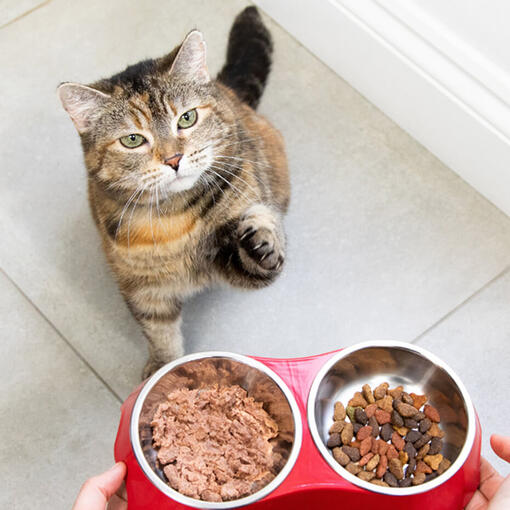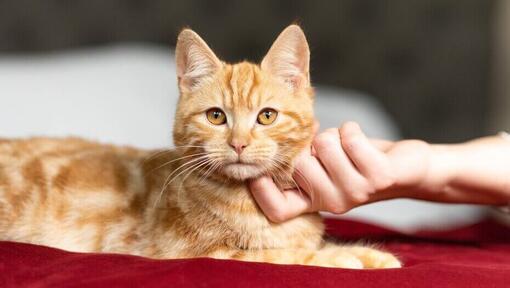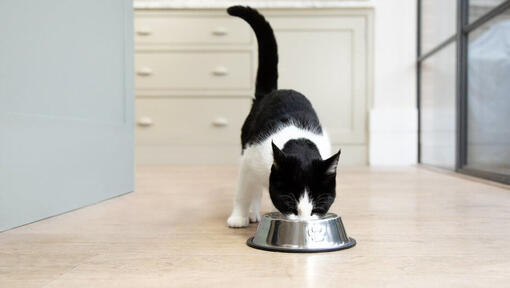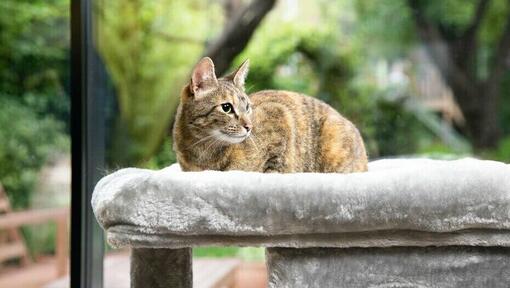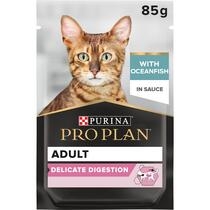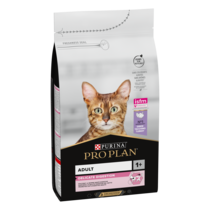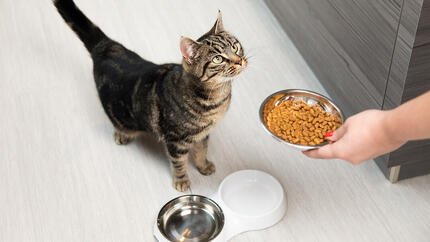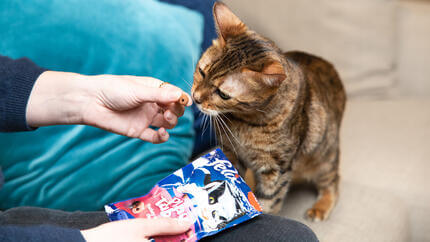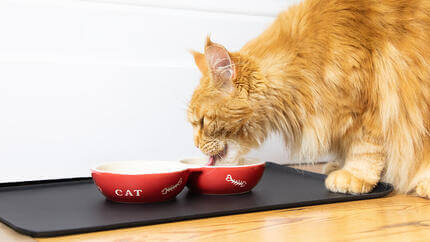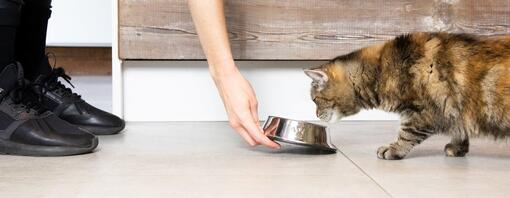
Cats are known for being proud and particular pets, and that doesn’t stop when it comes to what they eat! Like us, each cat will have their own favourite food and flavours, so fussy-eating cats might turn their nose up at something that doesn’t tantalise their taste buds.
If you find that your feline is being especially fussy, or that your cat is not eating at all, there are certain things you can try to get them gobbling up their dinner. However, if your cat is off their food for more than a day this can lead to serious complications including hepatic lipidosis (fatty liver). Contact a vet for advice if the following tips don’t improve your cat’s appetite.
Why is your fussy cat not eating?
Cats can be very fussy eaters, and this can be exacerbated by some of the factors listed below. Anorexia can also be a symptom of illness or disease, so you should seek veterinary advice if your cat has not eaten for more than 24-48 hours.
Lack of routine
Establishing a routine is the first step to nip fussy-eating in the bud. Stick to a feeding plan of meals at set times of day rather than allowing free-feeding, as this can help to establish routine around meal-times.
Chopping and changing how, when and what you feed your cat can be disruptive, and cause them to turn down their dinner.
Too many treats
If you think your cat is a fussy eater and notice that they’re being very picky, be patient. If you try to tempt a cat not eating much with your own tit bits or cat treats, they’ll soon learn that they can get a tasty reward for refusing their own food.
Fussy about flavours
Some fussy felines have a preference for certain flavours. If your cat prefers fish to fowl, Felix Pick ‘n’ Mix cat food bundles have the answer. Now you can choose 6 of your cat’s favourite flavours and build your box of 120 tasty pouches and get them all delivered right to your door. Browse our huge range of flavours with delicious recipes for adults and seniors and build your pawfect Felix bundle.
Other factors that create a fussy-eating cat
Sometimes fussiness can be caused by factors other than food – so it could be that your cat just prefers to have their meal served a certain way, rather than dislikes their dinner! Try some of the following tips to tempt a picky pet into eating:
Cat not eating due to factors in their environment
Sometimes fussiness can be caused by factors other than food – so it could be that your cat just prefers to have their meal served a certain way, rather than dislikes their dinner. Try some of the following tips to tempt a picky pet into eating:
- Some cats don’t enjoy an audience when they eat, so give your pet some peace and quiet at dinner time. Other cats love company and may only eat when being gently stroked or hand fed.
- We wouldn’t serve our dinner on a dirty plate, and some cats won’t eat out of a dirty bowl either. Make sure your cat's bowl is cleaned after each use to encourage them to eat, and prevent growth of bacteria on the dish.
- If your cat normally enjoys dry food but has suddenly become a fussy eater, you may need to replace your supply. As dry food absorbs moisture (especially in warm weather), your stocks may have turned stale.
- If your cat has started to turn their nose up at their usual wet food, it could be because it’s too cold. Wet food can lose its tasty aroma when kept in the fridge, and your cat won’t eat what they can’t smell. Try warming chilled wet food in the microwave for a few seconds so that it reaches room temperature, and it should hopefully tempt your cat to tuck in.
- If your cat is an outdoor pet, remember that there are plenty of opportunities for an unscheduled snack on the other side of the cat flap – if they’re quick enough to catch something. Some cat-loving neighbours may also enjoy feeding your cat. By the time dinner time arrives, your pet just might not be hungry.
- Like us, a cat’s loss of appetite can be related to hot weather. Where we may choose to opt for a light salad on a summer day, your pet may also not fancy a heavy meal when it’s hot outside.
- If you have a multi-cat household make sure there are enough food bowls for each cat to have their own, and space them apart so they don’t feel there is competition to eat. Even the friendliest of felines can feel stressed about sharing a food bowl with other cats.
What to do if your cat’s fussiness continues
If nothing seems to work and your cat is not eating, you could consider changing their food. Stick with their previous preference of wet or dry food, and introduce them to the new formula over a period of 7-10 days by gradually adding more of the new food to each meal. Sudden changes in diet can lead to diarrhoea and vomiting. Sometimes a simple change in recipe is all it will take to appeal to their taste buds.
If your cat seems keen, but is struggling to eat, they may have dental problems making it difficult or painful. If you think your cat’s gums look red or swollen you should book an appointment with the vet. Take a look at our handy guide on how to look after your cat’s teeth to avoid dental problems, and be sure to follow veterinary advice.
If your cat doesn't eat at all for 24 hours or more
If your fussy feline refuses all food for more than 24 hours, or is eating significantly less than usual, consult your vet. A cat not eating is a relatively non-specific symptom and can be an indication of a range of illnesses and diseases.
Cats gain essential amino acids from their diet, and a lack of these can lead to severe health issues even within a couple of days. They can also develop a liver condition known as hepatic lipidosis, and overweight cats are particularly at risk from this.
How to give medicine to a fussy cat
It can be tricky to give medicine to any cat, so it’s even tougher for a fussy eater.
If you think that you will struggle to medicate your pet with tablets, speak to your vet about whether there are alternative treatments. You can also ask them to show you how to safely and effectively administer pills.
Try to avoid hiding tablets or medicine in the food of a cat who is already fussy, as this may put them off food even more.
Do you have a fussy kitten? It might be a bit more difficult to convince younger cats to eat when they don’t feel like it. We’ve put together a guide explaining possible reasons why your kitten is not eating and what you can do to help restore their appetite.

